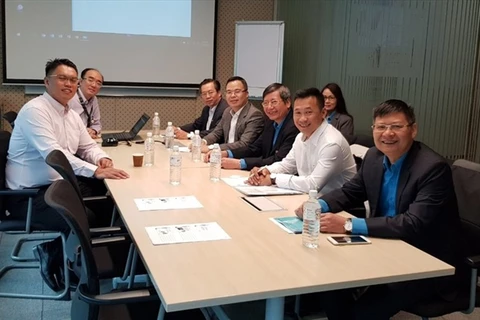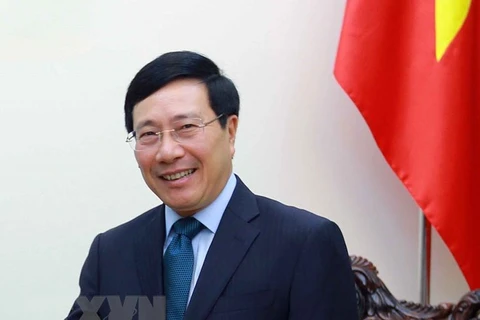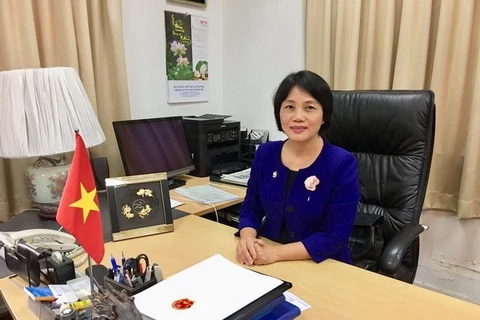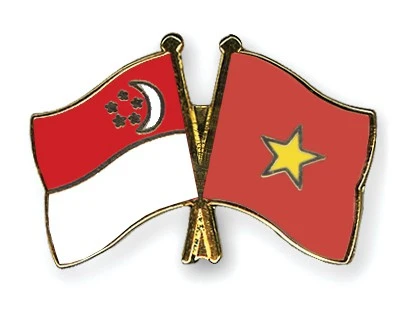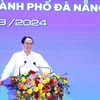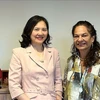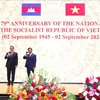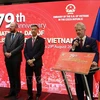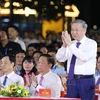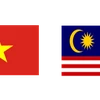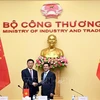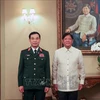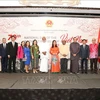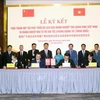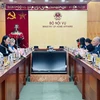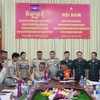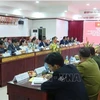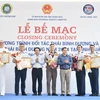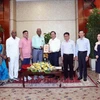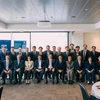Hanoi (VNA) - Vietnam and Singapore will mark the 45h anniversary of their diplomatic ties on August 1. On this occasion, Singaporean Ambassador to Vietnam Catherine Wong Siow Ping granted an interview to Vietnam News Agency about bilateral ties. Followings are the full text of the interview.
- Please give your comment on Vietnam-Singapore relations over the past 45 years, especially after the two countries upgraded bilateral relations to strategic partnership in 2013 and Prime Minister Nguyen Xuan Phuc’s visit to Singapore in April this year.
Singapore and Vietnam have a close and wide-ranging relationship underpinned by mutual trust, shared interests, and extensive cooperation both bilaterally and in multilateral fora. We share warm and friendly ties which are maintained through frequent exchanges at all levels. Prime Minister Lee Hsien Loong visited Vietnam twice in 2017 and will be visiting again in September 2018 to participate in the World Economic Forum on ASEAN at the invitation of Prime Minister Nguyen Xuan Phuc. Prime Minister Phuc and Deputy Prime Minister and Minister of Foreign Affairs Pham Binh Minh also made official visits to Singapore recently, in April 2018 and July 2018 respectively.
 Prime Minister Nguyen Xuan Phuc (L) holds talks with Prime Minister Lee Hsien Loong during his visit to Singapore in April 2018 (Photo: VNA)
Prime Minister Nguyen Xuan Phuc (L) holds talks with Prime Minister Lee Hsien Loong during his visit to Singapore in April 2018 (Photo: VNA) With the establishment of our Strategic Partnership in 2013, bilateral ties have strengthened further through enhanced collaboration in the areas of trade, defence, education, finance and aviation. As we celebrate the 45th anniversary of the establishment of diplomatic relations, and the fifth anniversary of our Strategic Partnership this year, we continue to explore new areas of cooperation. In fact, during Prime Minister Phuc’s visit to Singapore, Singapore and Vietnam signed six Memorandums of Understanding (MOUs) to boost cooperation in water and waste management, trade standards, Fintech, LNG (liquefied natural gas) development, banking supervision and renewable energy.
- What will be the main focus of cooperation between Vietnam and Singapore in the future?
Singapore-Vietnam ties are multifaceted and we seek to grow all aspects. Nevertheless, a key pillar of Singapore-Vietnam relations is our strong economic ties and we are working together to explore new opportunities for collaboration in that area.
Singapore is now Vietnam’s third-largest foreign investor and top ASEAN investor, with a cumulative investment of 43 billion USD invested in more than 1,800 projects. Singapore’s investments in Vietnam cover many sectors including real estate, manufacturing, energy, logistics and services. Following the construction of the first Vietnam-Singapore Industrial Park (VSIP) in 1994, six more VSIPs have been established. To date, the seven VSIPs have attracted over 10 billion USD in investments and created 174,000 jobs for the Vietnamese people.
 The ground-breaking ceremony for the Vietnam-Singapore Industrial Park in Nghe An province (Photo: VNA)
The ground-breaking ceremony for the Vietnam-Singapore Industrial Park in Nghe An province (Photo: VNA) Going forward, we see many new opportunities. We believe that there is much potential in some newer areas that Vietnam has been seeking to develop, such as renewable energy, digital start-ups, high-tech parks and smart cities.
With Hanoi, Ho Chi Minh City and Da Nang joining the ASEAN Smart Cities Network, there will be new opportunities for Singapore to share our experiences in building a Smart Nation with our Vietnamese friends.
Singapore companies have also expressed keen interest to expand their operations in Vietnam in the areas of infrastructure, urban solutions and digital architecture.
Critically as well, Vietnam is becoming more business-friendly. The Vietnamese Government has lowered regulatory impositions for foreign investments, offered support packages for targeted industries and provided tax breaks. In addition to Vietnam’s young and vibrant workforce, this makes Vietnam an attractive market for Singapore companies.
- Vietnam and Singapore signed an MoU on education cooperation in 2007. How do you assess the cooperation in the field between the two countries so far and what will be done to enhance the cooperation?
Both Singapore and Vietnam share a desire to foster a broad-ranging education system that inculcates future generations with a strong commitment to lifelong learning. Education cooperation between our two countries has been extensive.
Since 1997, 337 ASEAN Scholarships have been awarded to Vietnamese students at the secondary and pre-university levels to study in Singapore. Nineteen Lee Kuan Yew Fellowships have also been awarded to Vietnamese senior officials to pursue a one-year Masters in Public Management programme at the Lee Kuan Yew School of Public Policy. We continue to offer these scholarships.
The 2007 MoU on education cooperation was established to promote collaborative efforts between higher education and research institutions.
In March 2008, the Vietnam-Singapore Centre for Educational Excellence was set up to facilitate the training of school teachers and education administrators as part of a collaboration between Singapore’s National Institute of Education and Vietnam’s National Institute of Education Management. Singapore will continue to encourage its local institutions to participate in education development programmes in Vietnam.
Beyond academic programmes, Singapore and Vietnam have agreed to boost collaboration between their respective vocational training establishments, which includes joint programmes that facilitate information exchange between students of both countries.
Singapore also strongly supports Vietnam in the area of human resource development. Since 1992, more than 18,000 Vietnamese officials have attended courses under the Singapore Cooperation Programme, including those conducted under the Initiative for ASEAN Integration at the Vietnam-Singapore Training Centre in Hanoi. We are also currently working with Vietnam to upgrade the training centre into a cooperation centre which will provide capacity-building training beyond classroom-based courses, in tandem with Vietnam’s growing development needs.
- As ASEAN Chair in 2018, how do you see Vietnam’s contributions to building a resilient and innovative ASEAN?
Like Singapore, Vietnam is committed to constructive engagement and cooperation through multilateral fora such as ASEAN. We have many shared interests, including in maintaining ASEAN’s centrality in the region, and fostering a united ASEAN.
Vietnam has been an active regional player in addressing regional security, economic and socio-cultural issues, as well as non-traditional challenges such as climate change, counter-terrorism and digital security. Vietnam will continue to be a vital partner in fostering a strong and vibrant ASEAN community.
 Prime Minister Nguyen Xuan Phuc attends the plenery meeting of the 32nd ASEAN Summit in Singapore in April 2018 (Photo:VNA)
Prime Minister Nguyen Xuan Phuc attends the plenery meeting of the 32nd ASEAN Summit in Singapore in April 2018 (Photo:VNA) One new aspect is: as ASEAN Chair, Singapore has proposed the establishment of an ASEAN Smart Cities Network (ASCN). This is a collaborative platform which will facilitate cooperation on smart city development, share best practices and explore common technological solutions.
The ASCN’s main objective is to encourage its member cities to undertake sustainable urban development by leveraging upon smart technologies to improve everyday lives. We are happy to note that Vietnam has chosen Hanoi, Ho Chi Minh City and Da Nang to become part of this network.
Along with the other ASEAN Member States, we will work towards fostering partnerships with ASEAN external partners, the private sector and multilateral banks to explore new technologies that will improve the lives of our peoples.
Vietnam has been making big strides in info-communications and smart technology and we are confident that Vietnam can make significant contributions to ASCN.
- Thank you.-VNA
VNA


